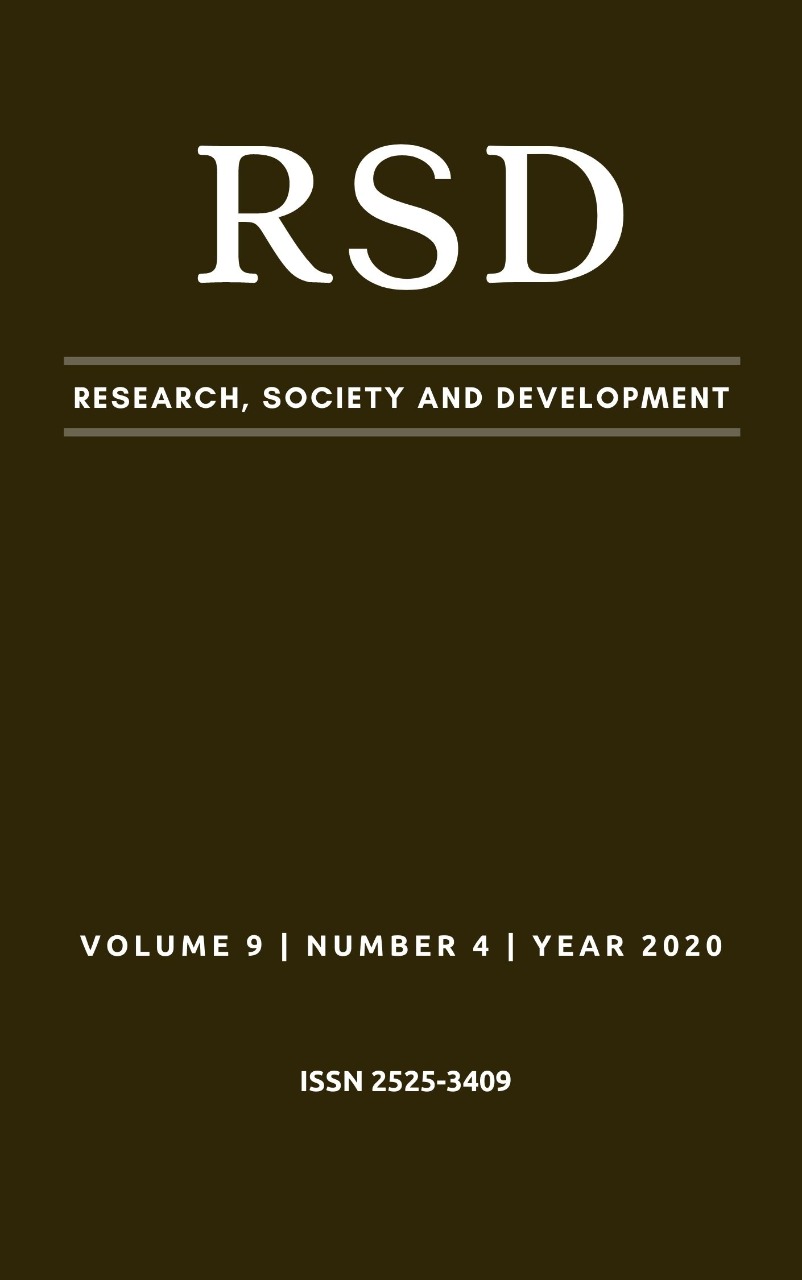Ser e estar professor na educação infantil: significações em movimento
DOI:
https://doi.org/10.33448/rsd-v9i4.2735Palavras-chave:
Organização, Ensino-Aprendizagem, Teoria Histórico-Cultural, Educação Infantil.Resumo
O artigo que se apresenta tem por objetivo expor uma reflexão sobre o ser e estar professor na Educação Infantil em relação à organização do processo de ensino-aprendizagem para este segmento. É uma pesquisa de abordagem qualitativa, fundamentada na perspectiva da Teoria Histórico-Cultural (THC), na qual foram utilizadas as pesquisas: bibliográfica, documental e de campo. A pesquisa bibliográfica tomou como referência autores como: Vigotski, Elkonin, Leontiev, Davídov, a pesquisa documental referenciou o marco oficial norteador da Educação Infantil e a pesquisa de campo se desenvolveu por meio de entrevistas de professores que atuam nesse nível de ensino. Foram utilizados, como instrumentos de coleta dos dados, uma ficha de registro das informações dos documentos e da bibliografia selecionada e entrevista semiestruturada. Foram entrevistados professores que atuam em escolas municipais de Educação Infantil, localizadas na zona rural do município de São José do Mipibu-RN. Considerando a necessidade de apreender os sentidos atribuídos pelos sujeitos participantes da pesquisa em relação ao objeto de estudo, os dados obtidos nas entrevistas foram analisados em consonância com a proposta metodológica dos núcleos de significação, cunhada por Aguiar e Ozella (2006), em conformidade com o método analítico objetivo de Vigotski (1984). Na conclusão da pesquisa apresentamos contribuições para o aprimoramento da organização do ensino-aprendizagem na Educação Infantil, proporcionando aos professores refletirem sobre as relações entre a organização dos processos de ensino-aprendizagem e o desenvolvimento das funções psíquicas superiores das crianças.
Referências
Aguiar, W.M.J. & Ozella, S. (2006). Núcleos de significação como instrumento para a apreensão da constituição dos sentidos. Psicol. cienc. prof. [online]. 2006, 26(2): 222-245. Disponível em: http://www.scielo.br/scielo.php?pid=S1414-98932006000200006&script=sci_abstract&tlng=pt
Almeida, ARS. (1999). A emoção na sala de aula. Campinas, SP: Papirus.
Arroyo, M.G.O.(1994). Significado da infância. IN: I Simpósio Nacional de Educação Infantil. Anais. Brasília: MEC. p. 88-92. Disponível em: http://www.dominiopublico.gov.br/download/texto/ me002748.pdf. Acesso em:
Brasil.(1998). Ministério da Educação e do Desporto. Secretaria de Educação Fundamental. Referencial Curricular Nacional para a Educação Infantil. RCNEI-Brasília: MEC/SEF. Disponível em: http://portal.mec.gov.br/seb/arquivos/pdf/rcnei_vol1.pdf. Acesso em: mar.2018.
Brasil. (2013).Ministério da Educação. Secretaria de Educação Básica. Revisão das Diretrizes Curriculares Nacionais para a Educação Infantil. (DCNEI). In: Diretrizes Curriculares Nacionais da Educação Básica. Brasília. . Disponível em: http://portal.mec.gov.br/docman/julho-2013-pdf/13677-diretrizes-educacao-basica-2013-pdf/file. Acesso em: mar.2018.
Bogoyavlensky, D. N., & Menchinskaya, N. (1991). A relação entre aprendizagem e desenvolvimento psicointelectual da criança em idade escolar. In: LURIA, A. R. et al. Psicologia e Pedagogia I: bases psicológicas da aprendizagem e do desenvolvimento. Tradução: Rubens Eduardo Frias. São Paulo: Editora Moraes.
Cerisara, A. B. (2002). Professoras de educação infantil: entre o feminino e o profissional. São Paulo: Cortez, (Coleção Questões da Nossa Época, v. 98).
Davídov, V.V. (1999). Uma nova abordagem para a investigação da estrutura e do conteúdo da atividade. In: Hedegard, Mariane e Jensen Uffe Jull. Activity theory and social practice: cultural-historical approaches. Aarhus (Dinamarca), Aarthus University Press.
González Rey, F.L.(2002) Pesquisa qualitativa em Psicologia: caminhos e desafios. São Paulo, Pioneira Thomson Learning, 2002.
Pasqualini, JC, Martins, LM. (2008). A Educação Infantil em busca de identidade: análise crítica do binômio "cuidar-educar" e da perspectiva anti-escolar em Educação Infantil. Psicol. educ. São Paulo , 27(1): 71-100, dez. Disponível em http://pepsic.bvsalud.org/scielo.php?script=sci_arttext&pid=S1414-69752008000200005&lng=pt&nrm=iso
Pereira, A.S., Shitsuka, D. M., Parreira, F. J., & Shitsuka, R. (2018). Metodologia da pesquisa científica. [e-book]. Santa Maria. Ed. UAB/NTE/UFSM. Disponível em: https://repositorio.ufsm.br/bitstream/handle/1/15824/Lic_Computacao_Metodologia-Pesquisa-Cientifica.pdf?sequence=1. Acesso em: 24 fev. 2020.
Tassoni, E. C. M. (2000). Afetividade e produção escrita: a mediação do professor em sala de aula. Dissertação de Mestrado, Faculdade de Educação UNICAMP.
Vigotski, L.S. (1984). Formação social da mente. São Paulo: Martins Fontes.
Vigotski, L. S. (2000). A Construção do Pensamento e da Linguagem. São Paulo: Martins Fontes.
Wallon, H. (1975). Disciplina e perturbações do caráter. In: Psicologia e educação na infância. Lisboa: Editorial Estampa.
Downloads
Publicado
Edição
Seção
Licença
Autores que publicam nesta revista concordam com os seguintes termos:
1) Autores mantém os direitos autorais e concedem à revista o direito de primeira publicação, com o trabalho simultaneamente licenciado sob a Licença Creative Commons Attribution que permite o compartilhamento do trabalho com reconhecimento da autoria e publicação inicial nesta revista.
2) Autores têm autorização para assumir contratos adicionais separadamente, para distribuição não-exclusiva da versão do trabalho publicada nesta revista (ex.: publicar em repositório institucional ou como capítulo de livro), com reconhecimento de autoria e publicação inicial nesta revista.
3) Autores têm permissão e são estimulados a publicar e distribuir seu trabalho online (ex.: em repositórios institucionais ou na sua página pessoal) a qualquer ponto antes ou durante o processo editorial, já que isso pode gerar alterações produtivas, bem como aumentar o impacto e a citação do trabalho publicado.


